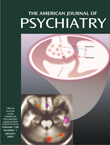Is Age at Symptom Onset Associated With Severity of Memory Impairment in Adults With Obsessive-Compulsive Disorder?
Abstract
OBJECTIVE: Age at onset is a potentially important marker for neurobiological features of obsessive-compulsive disorder (OCD). This study examined the relationship between age at symptom onset and memory impairment in adults with OCD. METHOD: The authors used the Rey-Osterrieth Complex Figure Test and the California Verbal Learning Test to compare memory functioning of 37 adult OCD patients with self-reported childhood onset of symptoms (onset at less than 18 years of age) with that of 31 patients with adult-onset symptoms. RESULTS: No differences were found between the two groups on any of the verbal and nonverbal memory measures. CONCLUSIONS: Self-reported age at symptom onset is not associated with memory performance in adult patients with OCD according to tests previously found to be sensitive to frontal-striatal system dysfunction and impairment in OCD. Such dysfunction appears to be a consistent feature of OCD in adults, regardless of age at initial symptom onset.



